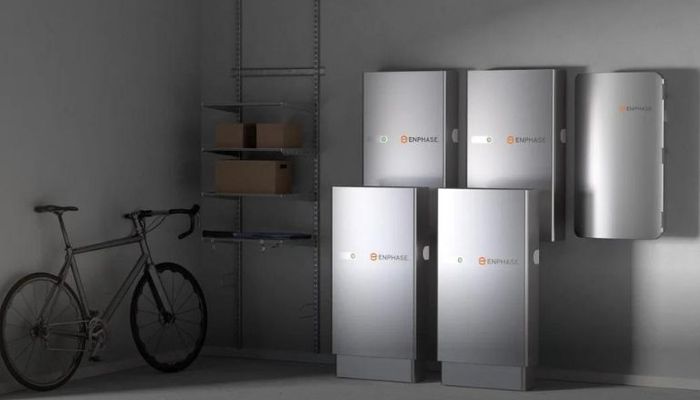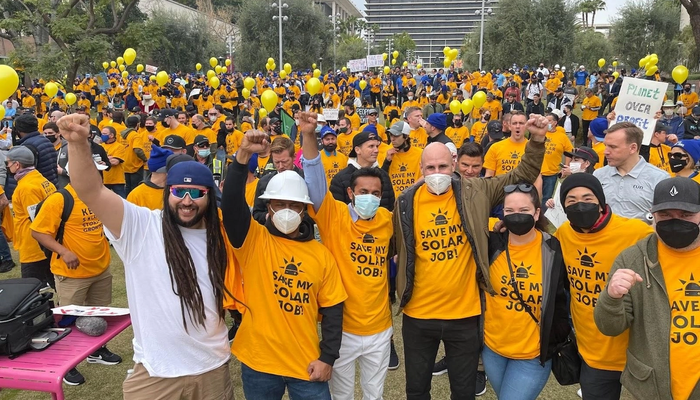The True Cost to Install Solar Panels in 2023

In the United States, the national average cost for a residential solar energy system ranges between $16,870 and $23,170 after federal tax incentives.
Before you get discouraged by the price tag, remember that this number can vary depending on several factors:
- Your location
- The number of solar panels
- Solar panel brands
- Solar panel efficiency
- Professional installation vs. DIY installation
This article will cover the specifics of solar panel installation costs. Additionally, we’ll also share some tips on saving money with your solar system and installation.
How Much Does It Cost to Install Solar Panels?
Your total cost for installing solar panels breaks down into a few different components. Here’s what you can expect:
- Solar panels are approximately 25% of your total cost
- Inverters are approximately 10% of your total cost
- Racking, mounting and BOS are approximately 10% of your total cost
- Installation and soft costs are approximately 55% of your total cost.
Let’s take a closer look at the costs of each component.
Solar Panels: 25% of Solar Installation Cost
The cost of solar panels varies from $.70 to $1.50 per watt. While the difference seems nominal on paper, you’ll need to multiply that per-watt cost by the total wattage of all your solar panels combined.
Here’s what impacts the cost per watt of a solar panel:
- Solar Panel Manufacturer: Factors like the brand’s reputation, its number of years in business and the quality standards they employ in the manufacturing process will all affect solar panel costs.
- Solar Panel Warranty: Extended warranties or warranties with more benefits will result in a higher cost per watt. It’s up to you to decide if a generous warranty is worth the higher price. Learn more about warranties before making a decision.
- Solar Panel Efficiency: Higher efficiency means higher power output in a smaller space, but these panels are more expensive. We advise using high-efficiency solar panels only if you have limited space for your solar panel installation. Otherwise, you’ll be able to save quite a bit of money.
- Type of Solar Panels: There are three main types of solar panels to choose from. Thin-film solar panels are cost-friendly but take up the most space. Monocrystalline solar panels are more efficient, but generally more expensive. And finally, polycrystalline solar panels, which are less efficient than mono, but also cost less. Today, most consumers opt for monocrystalline panels.
- Solar Panel Aesthetics: Solar panels with black backsheets and frames look great on your roof, but they cost more. Opt for aesthetic solar panels if you’re planning to install them on the front of your home or if you have limitations with your neighborhood or HOA.
- Number of Solar Panels: The number of solar panels you need doesn’t affect the cost per watt but will affect the overall cost of your solar system. Check out our Solar Calculator to determine how many solar panels you need and find the best system size.
Read more: The Best Solar Panels for Homes
Inverters: 10% of Solar Installation Cost
Inverters convert DC power into usable AC power for your home’s energy needs. Expect to pay around $.30 - $.40 per watt for your inverter(s). Factors that affect cost include the inverter brand and solar system size.
Some solar inverters, like the latest Enphase microinverters, cost a little more but come with excellent features and benefits and are easy to install.
Racking, Mounting and BOS: 10% of Solar Installation Cost
Every solar energy system must include either a roof racking or ground mounting system, plus its attachments. The cost of these parts will vary based on your home’s roof material or the racking and mounting option you choose.
You’ll also need BOS or balance of system pieces. These include grounding hardware, system labels, junction boxes, disconnects, combiner boxes, wires and conduit, which you can obtain from your local home improvement store.
The cost of racking and BOS pieces are specific to your location but generally run about $.25 - $.50 per watt.
Installation and Soft Costs: 55% of Solar Installation Cost
Over half of your total cost — often up to $2.00 per watt — might go to the professional solar installer. These costs cover things like:
- Labor and wages
- Worker’s compensation insurance
- Permitting fees
- Interconnection fees
- Indirect corporate costs, especially if you’re working with a major solar company primarily looking to profit.
You can save a significant amount of money if you opt for a do-it-yourself solar panel installation. More on this below.
Average Solar Panel Installation Costs by Location
When it comes to determining your solar panel installation cost, geography matters too. Here is the typical cost range for a solar installation in some states before considering the federal tax credit.
| Arizona | $2.50 - $3.75 per watt |
| California | $2.50 - $4.50 per watt |
| Colorado | $2.75 - $5.00 per watt |
| Connecticut | $2.50 - $4.00 per watt |
| Florida | $2.50 - $3.75 per watt |
| New Mexico | $2.50 - $4.50 per watt |
| New York | $2.75 - $4.50 per watt |
| Oregon | $2.50 - $4.25 per watt |
| Texas | $2.50 - $4.00 per watt |
How to Reduce the Cost of Solar Installation
There are several ways to cut back solar installation expenses. Let’s review them.
Take Advantage of Tax Credits and Rebates
The US government offers a 30% solar tax credit that can be claimed on your federal income taxes. It applies to all solar installations between 2022 and 2032.
Remember, if you want to finance your solar panel installation, choose a financing option that allows you to take advantage of the federal tax credit. Most solar lease options don’t offer this benefit.
Lastly, check for state or local rebates for solar installations.
Read more: An Overview of Solar Incentives, Rebates and Tax Credits
Carefully Evaluate Financing
It’s best to pay for your entire solar system upfront, but you can finance your solar system if you’re unable to.
Remember, there is always interest associated with borrowing money and financing items. Solar leases and loans often span 20 years, so read the fine print regarding interest rates and whether or not you’ll even get the federal tax credit. You may want to consider a home equity loan versus a solar-specific loan instead.
Opt for DIY Installation
A DIY solar installation is a great way to save nearly half of your total solar costs.
Keep in mind that you’ll still have to pay for things like permitting and interconnection fees. However, you can significantly reduce or eliminate labor costs and corporate costs, which will make a major difference in the total cost of your system.
Learn more: DIY Solar: Is It Worth It?
Try a Hybrid DIY Installation
Not comfortable doing a complete installation all by yourself? You can still save money by doing some parts yourself and getting help from a contractor when needed. Some DIYers install the racking and panels first, then hire a contractor to complete the electrical work.
Get Expert Help
When it comes to solar panel installation, you’ll want to do it correctly the first time. Using incompatible equipment or making errors during installation is dangerous and can add to your solar panel installation cost.
To ensure the process goes as smoothly as possible, work with a skilled and knowledgeable solar company like GoGreenSolar.
The folks at GoGreenSolar are industry veterans and DIY experts. If you’re looking to save money with your installation but want expert help by your side, reach out to GoGreenSolar today.
- Customers receive free technical support from certified NABCEP professionals via phone or email
- Permitting service and interconnection service available — we’ll handle the paperwork, so you don’t have to!
By choosing GoGreenSolar for your system and DIY installation, you’ll be able to save thousands of dollars and feel confident about installing your system right the first time!






